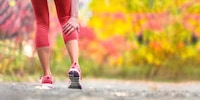
Background information
Myth busting: does strength training really reduce mobility?
by Claudio Viecelli

Exercise is healthy and keeps us mentally fit. But it doesn’t always have to be a gym session or a long jog. Attention non-sports fans – scientists have now established that even a few minutes of intensive everyday activity can prolong your life.
Although vigorous physical activity has great potential for health, most adults aged 40 and over don’t play sports or engage in strenuous physical activity [1–3]. For a long time, little attention was paid to the health value of physical activity lasting less than 10 minutes [4,5]. However, as the effects on our health depend on intensity, even short, intense activities can have positive effects [6–9].
To answer this question, researchers led by Emmanuel Stamatakis from the University of Sydney collected data from 25,241 non-athletes (mean age 61.8 years, 14,178 women and 11,063 men, no physical activity and no more than one walk per week) from the UK Biobank and observed them over a period of almost seven years [10]. The UK Biobank is a large database containing genetic and health information from half a million UK participants. It’s used by scientists worldwide to research the causes of diseases and develop treatments. Stamatakis and his colleagues recorded how many people died over the observation period of 6.9 years, along with the cause of death.
To do this, the researchers analysed the data from study participants who wore an activity tracker on their wrist for seven days. The accelerometer data from these wearable devices enabled them to record unexplored movement patterns such as short periods of vigorous intermittent lifestyle physical activity (VILPA). VILPA refers to short, sporadic phases of intense physical activity in everyday life of up to 1–2 minutes, such as walking very quickly on the way to work or climbing stairs. The study examined the association between VILPA and all-cause, cardiovascular and cancer mortality.
The results indicated that a low level of vigorous physical activity is associated with significantly lower mortality. Participants with a mean VILPA activity pattern of three units of 1–2 minutes per day were able to reduce their all-cause and cancer mortality risk by 38 to 40% and their cardiovascular disease mortality risk by as much as 48 to 49% compared to those who didn’t demonstrate VILPA. So, the researchers have discovered that just a few small VILPAs per day can prolong life and prevent diseases.
The Federal Office for Sport currently recommends that adults do at least 2.5 hours of exercise per week in the form of everyday activities or sport of at least moderate intensity, or 1.25 hours of sport or exercise of high intensity. Activities lasting more than 10 minutes can be added up over the course of a day.
However, if you don’t do exercise or don’t have time for it, you should make sure you do at least a few small, high-intensity activities in your everyday life – be it climbing stairs, walking up hills, playing with the dog or running for the bus.
So, the focus is now on all physical activities, regardless of the duration of the strain. This means that a future recommendation could be that you can also get health benefits from short, high-intensity activities.
Header image: Shutterstock
Molecular and Muscular Biologist. Researcher at ETH Zurich. Strength athlete.
Interesting facts about products, behind-the-scenes looks at manufacturers and deep-dives on interesting people.
Show all
Background information
by Claudio Viecelli

Background information
by Claudio Viecelli

Background information
by Claudio Viecelli